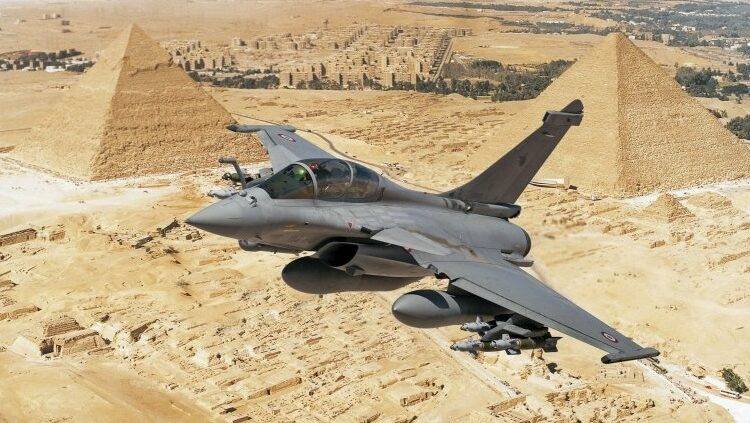1571 Views
Egypt's Strategic Gambit: How Rafale Jets Are Reshaping Middle Eastern Alliances and Challenging Israeli Air Superiority
Egypt, as one of the key countries in the Southwest Asian and North African region, has always played a significant role in regional developments. Today, it seeks to redefine its capabilities across various domains — one of which is strengthening its military power, particularly its air force. In 2021, Egypt signed a contract with France to purchase 30 Rafale fighter jets, and this month, it received the first batch of four aircraft. This event could pave the way for a series of developments in the region—some of which Egypt itself may not yet have fully considered.
The delivery of these jets goes beyond a mere military transaction; it marks a gradual shift in Cairo’s strategic alignment—from dependence on Russia toward closer cooperation with the West and NATO-affiliated suppliers. Until recent years, Egypt had been seeking to acquire Russian Su-35 fighter jets. However, according to multiple reports, that deal was canceled due to concerns over potential U.S. sanctions and negative technical assessments of the aircraft’s radar and electronic systems. In contrast, collaboration with France opens doors for Egypt to access advanced Western technologies, European bank financing for part of the purchase, and more stable diplomatic ties with Western powers.
By acquiring the new Rafale fighters, Egypt has not only reduced its reliance on Russian weaponry but also strengthened its bargaining position in dealings with the West—allowing it to avoid strategic dependency on a single partner. This new approach enables Cairo to preserve political independence while insulating itself from unilateral pressure.
The Rafale F3R fighters are among the world’s most advanced multirole combat aircraft, equipped with AESA radar, sophisticated electronic warfare systems, and the capability to carry a wide range of precision-guided munitions. These jets can perform diverse missions, including air superiority, ground attack, reconnaissance, and naval operations. Their introduction transforms Egypt’s air force into one of the leading aerial powers in the region. With their ability to launch laser- and radar-guided missiles and operate at extended ranges, Egypt is now better positioned to enhance deterrence against both regional and domestic threats—particularly in the Sinai Peninsula.
From the perspective of some Israeli analysts, this development may gradually alter the traditional airpower balance between Egypt and the Israeli regime. While Israel still maintains technological superiority through its fifth-generation F-35 fleet, Egypt’s acquisition of advanced Rafales could narrow this gap. Although this does not constitute a direct threat, it could spark strategic competition or heighten political and military tensions—potentially contributing to instability along Egypt’s borders in the future.
Politically, the Rafale deal also sends a clear message to major powers: Egypt’s alignment with the Western bloc is deepening, and Cairo no longer depends on a single partner. For Paris, the agreement symbolizes the strengthening of a strategic partnership with one of the key powers in Southwest Asia and North Africa. For Egypt, it represents a pathway to securing economic and security support from Europe and the United States at a time when the country faces severe economic challenges.
Moreover, this deal enables Cairo to play a more active role in shaping the emerging international order. Egypt aims to assert itself as both a mediator and a regional power in the security disputes of the Red Sea, the Eastern Mediterranean, and North Africa. Cooperation with France—a NATO member—provides a tool for reducing political and financial pressures while reinforcing Egypt’s standing in regional security dynamics.
However, another crucial point is that Egypt’s move could trigger a regional arms race. Efforts by countries to maintain military superiority may, in fact, fuel further instability. Economically and politically, the implications of Egypt’s decision are multifaceted. On one hand, Western countries such as France, the United States, and the United Kingdom will benefit from increased demand for advanced weaponry. Arms exports could serve as a new economic stimulus for Europe, whose economy remains under pressure due to the war in Ukraine. On the other hand, growing military expenditures in the Middle East may divert financial resources away from economic and social development—potentially exacerbating regional tensions.
While the Rafale deal with France forms a central pillar of Egypt’s air force modernization strategy, Cairo still seeks to diversify its sources of weaponry. Reports have surfaced about Egypt’s interest in purchasing Chinese J-10C fighters. Although Beijing denied any delivery of these jets to Egypt in 2025, such negotiations reflect Cairo’s determination to avoid complete dependence on the West.
In fact, diversification in arms procurement offers Egypt two major advantages: first, reducing political and technical dependence on a single bloc, and second, enhancing its leverage in military and financial negotiations with both Western and Eastern partners. Nonetheless, operating a mixed fleet comes with challenges—such as differing spare parts, pilot training requirements, and maintenance complexities. Therefore, Egypt must strike a balance between strategic autonomy and high operational costs if it intends to sustain its status as a credible military power.
Ultimately, the Rafale deal represents the beginning of a strategic partnership between Egypt and France that serves both sides’ interests. For Egypt, it strengthens deterrence capabilities and diversifies strategic partnerships; for France, it underscores its economic, military, and technological relevance as a provider of high-end defense systems. Hence, the Rafale agreement between Cairo and Paris stands as a clear example of the convergence of military and economic interests—transforming not only Egypt’s air power but also reshaping the region’s political and security landscape.
Translated by Ashraf Hemmati from the original Persian article written by Amin Mahdavi
https://www.egypttoday.com/Article/1/102571/Egypt-signs-contract-with-France-to-buy-30-Rafale-fighter
https://bulgarianmilitary.com/2025/04/14/russia-sends-su-35-fighters-to-algeria-in-secret-arms-shift/
https://militarywatchmagazine.com/article/france-resumes-rafale-deliveries-egypt
https://www.washingtoninstitute.org/policy-analysis/understanding-egyptian-militarys-perspective-su-35-deal
https://carnegieendowment.org/sada/2022/01/the-cairo-paris-axis?lang=en

Comment
Post a comment for this article